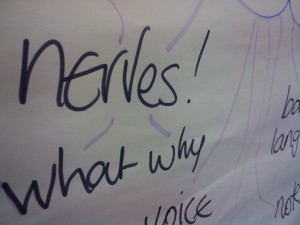Communicating With Impact – A two-day development event for a group of six senior managers
9th and 10th October 2013: Real Life Options, Knottingley
A two-day development event for a group of six senior managers
Day 1: Practical Public Speaking Skills
A day of concentrated practice with each delegate delivering an elevator pitch, a personal interest presentation and a business presentation, followed by feedback
To what extent were the course objectives achieved?
At first, daunting to have to speak in front of colleagues, but by doing this exercise there was reinforcement in the ways in which we can / should engage through the spoken word
Activities were well-planned
Good feedback to improve future standards
Gave various methods to practice presenting and making you deliver something that you had not prepared
Enjoyable, informative day
How enjoyable were the activities?
Once moved on from embarrassment, the activities were enjoyable
Presenting in the afternoon became easier, as the group became more familiar
Very enjoyable and engaging
They were really good
About the trainer Philippa Hammond
Very helpful and insightful
Philippa gave tips and hints throughout the day which were very helpful
Excellent feedback throughout the day
Very competent and informative
Really good constructive feedback
How useful will the techniques learned be to you at work?
A number of comments made, such as “task, values and language”, “like, trust and understand” and “stop, start, continue” will be very helpful
I will take on board comments and try to use these in future
Invaluable!
What was the most useful part of the workshop for you?
Discussion and realise that others felt / experiences were the same
Standing up and presenting the materials that I had prepared
Practising presenting, preparing presentations
Discussion and peer feedback
Making me stand up
The realisation that my lengthy script really wasn’t required
Comments
The anecdotes and comments in between the presentations were helpful
All will be helpful
Day 2: Persuading, Influencing and Facilitation Skills
A day exploring the skills needed to persuade and influence others, with a Dragons’ Den-style pitch, plus a set of ten professional facilitation skills ideal for meetings, training sessions and conference discussions
To what extent were the course objectives achieved?
Fully met
The facilitation skills top ten pointers were very helpful
More opportunities to practice presenting / speaking
Good information meeting all objectives
How enjoyable were the activities?
Good and informative
More relaxed during second day – enjoyed Dragons’ Den
The facilitation skills activities were very helpful
Good fun – allowed for humour
About the trainer Philippa Hammond
Excellent facilitation skills
Philippa’s knowledge and preparation was excellent, well planned
Flexible approach, meeting needs of group
How useful will the techniques learned be to you at work?
All skills v useful
Tried to take on board comments from yesterday
The facilitation skills for team meetings
The techniques learned can be used in all aspects of my work
Feel so much better about next presentation!
What was the most useful part of the workshop for you?
General participation
Continued practice from day 1
Facilitation skills and different methods of facilitating
Different facilitation techniques
Comments
I have really enjoyed the 2 day experience
Very enjoyable / nerve-wracking, very helpful in my work
Good fun, very informative
RLO senior managers

